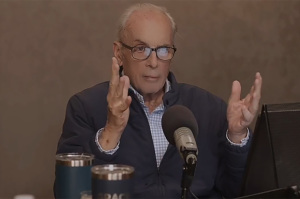Hillary Clinton: Iran Should Not 'Miscalculate' U.S. Commitment to Middle East
Secretary of State Hillary Clinton warned Iran on Sunday that it should not “miscalculate” the United States’ commitment to the Middle East even though U.S. troops will be withdrawn from Iraq soon.
Clinton appeared on four talk shows to defend President Obama's recently announced plans to withdraw all combat forces from Iraq by the end of the year. One of the criticisms of the plan is that Iran will seek to have more influence in Iraq without a U.S. troop presence there.
In a Sunday interview, CNN's Fareed Zakaria asked Iranian President Mahmoud Ahmadinejad if Iran would seek to take over the training of Iraq's security forces after the United States leaves. “I think we should have done it sooner, maybe seven or eight years ago,” Ahmadinejad said.
Clinton responded on CNN's “State of the Union,” saying that the United States will be continuing a training mission in Iraq. Combat troops and bases will be withdrawn, but the military forces that are there to train the Iraqi military will remain.
“It's also important to underscore that Iran would be badly miscalculating if they did not look at the entire region and all of our presence in many countries of the region, both in bases, in training, [and] with NATO allies like Turkey,” Clinton said.
Clinton also emphasized that Obama's timetable for withdrawing troops was first agreed upon under the administration of President George W. Bush. Obama's decision to withdraw troops by 2012 came after he was unable to negotiate legal immunity for troops that would be based in Iraq.
But Senators John McCain (R-Ariz.) and Lindsay Graham (R-S.C.) argued that the withdrawal of U.S. troops will be too early and the Iraqi military will be unable to maintain stability.
“It's a serious mistake,” McCain said on ABC's “This Week” regarding the decision. “There was never real serious negotiations between the administration and the Iraqis. They could have, clearly, made an arrangement for U.S. troops.”
“The question of immunity could have been resolved,” McCain added. “The question of immunity is being used as an excuse for not reaching an agreement.”
Graham took the same view on “Fox News Sunday.” When he visited Iraq in May, Graham said, U.S. military leaders told him that the Iraqi military was not ready to take over Iraq's security needs and Iraqi political leaders were open to allowing the U.S. troops to stay longer.
“This was a failure by the Obama administration to close the deal,” Graham said.
On the topic of Libya, Graham applauded the president for getting the U.S. military involved in the process that led to the toppling, and recent death, of Muammar Gaddafi, but he also criticized the president for “waiting so long” before getting involved.
Gaddafi “was on the ropes, we let him off the ropes, and we only got involved when he was about to massacre everybody in Misurata. Thank God for strong women I said at the time.”
Graham was referring to the fact that Clinton and United Nations Ambassador Susan Rice were pushing for involvement in Libya at the time.
Clinton, whose celebratory reaction after receiving news that Gaddafi was dead was caught on camera, said she would support an investigation into the circumstances of Gaddafi's death. Gaddafi may have been killed after he was captured.
She also said she would like to see Abdelbaset al-Megrahi, the “Lockerbie bomber,” returned to prison. Al-Megrahi was released from a Scotland prison early and sent to Libya two years ago. British Petroleum has been accused of arranging the prisoner transfer in order to secure oil-drilling rights with Libya.





























